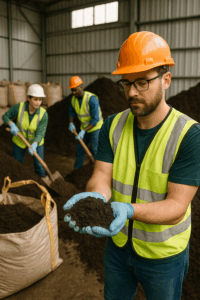Researchers in Barbados are harnessing invasive sargassum seaweed to produce bio-compressed natural gas for vehicles, presenting an innovative response to the economic and ecological impacts of climate change. This project reflects the Caribbean's commitment to creating sustainable energy sources while addressing the pressing issue of sargassum accumulation on coastlines.
Transforming Sargassum: The Caribbean's Innovative Leap Towards Sustainable Fuel

Transforming Sargassum: The Caribbean's Innovative Leap Towards Sustainable Fuel
A breakthrough initiative is converting invasive seaweed into biofuel, offering a promising solution to both environmental challenges and energy needs in the Caribbean.
From the shores of Barbados to the wider Caribbean, a groundbreaking project is turning a problematic seaweed into a source of energy. Since 2011, invasive sargassum has washed ashore, covering pristine beaches, disrupting tourism, and posing health risks due to the foul odors that arise as it decomposes. The situation became critical enough that in 2018, the Prime Minister of Barbados, Mia Mottley, identified sargassum as a national emergency.
However, a dedicated group of Caribbean scientists and environment-conscious innovators are reversing the narrative surrounding this invasive algae by repurposing it into bio-compressed natural gas (bio-CNG) for vehicles. Spearheaded by the University of the West Indies (UWI) in Barbados, the innovative fuel is complemented by wastewater from local rum distilleries and dung from blackbelly sheep, which is crucial for the necessary anaerobic digestion process.
Dr. Legena Henry, a renewable energy expert and one of the project's pioneers, explained that the sargassum's abundance—something the Caribbean struggles with—makes it a promising fuel substitute. After initially exploring sugarcane as a potential resource, the team shifted their focus to a solution that was more plentiful and readily available. This pivot stemmed from observations made by student Brittney McKenzie, who pointed out the immense volume of trucks transporting sargassum from local beaches.
With their approach gaining momentum, the team quickly filed a patent for their biofuel formula, and ideas took off further after presenting their project during the UN General Assembly in 2019. They soon attracted support from the US non-profit Blue Chip Foundation, securing a $100,000 investment to advance their research.
However, the journey hasn't been without challenges. The invasive algae not only impacts local tourism but also poses dangers to wildlife and human health, prompting calls for eco-reparations as the Caribbean grapples with the climate crisis. Amid sharing in these struggles, Dr. Henry and her team are pioneering a sustainable way forward that promises to yield economic benefits while improving environmental conditions.
Having successfully tested a Nissan Leaf powered by their biogas, both Dr. Henry and her colleague Shamika Spencer share the ecstasy of their remarkable achievement. Spencer, deeply invested in examining the potential solutions to the pervasive seaweed issue, reflects on how vital it is to repurpose sargassum to protect local ecosystems and tourism.
Looking ahead, Dr. Henry envisions scaling the project, including plans for a biogas station and further innovations derived from sargassum, with a goal of creating commercially viable solutions. The efforts extend beyond the shores of Barbados, offering an example of how innovation can arise in response to global ecological challenges.
As the Caribbean forges ahead on this innovative path, the transformative work of these scientists serves as a beacon of hope, showing that the region can take control of its environmental destiny through creativity and resilience. Emphasizing the importance of perseverance, both innovators encourage aspiring scientists to harness their ideas and embrace the possibility of impactful discoveries.



















